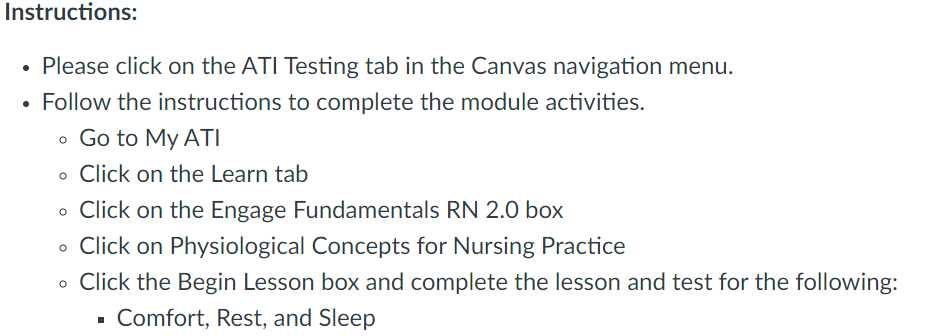NUR105 M7.3: ATI Engage Fundamentals: Comfort, Rest, and Sleep
Question 1: A nurse is contributing to a presentation about non-pharmacological interventions used to promote sleep. Which of the following information should the nurse recommend including in the presentation?NUR105 M7.3: ATI Engage Fundamentals
Answer: c. Non-pharmacological interventions used to help promote sleep include acupuncture and thermotherapy.NUR105 M7.3: ATI Engage Fundamentals
Question 2: A nurse is caring for a client who takes an over-the-counter (OTC) sleep aid medication every evening. Which of the following findings should the nurse identify as a potential adverse effect of OTC sleep aid medications?
Answer: d. Urinary retention
Question 3: A nurse is caring for a client who needs to be awakened for the administration of an oral medication. Which of the following findings should indicate to the nurse that the client was in stage 3 of the sleep cycle when awakened?
Answer: c. The client experiences mental cloudiness for 30 to 60 min.NUR105 M7.3: ATI Engage Fundamentals
Question 4: A nurse is caring for a client who has a history of migraines. The client tells the nurse, “I have not been sleeping well. My migraine headaches have returned after not having one for over a year.” The nurse should identify that which of the following are potential contributing factors to the client’s migraines? (Select all that apply)
Answers: Sensory overload, Sleep deprivation
Question 5: A nurse is caring for a client who has a new prescription for a nonbenzodiazepine hypnotic to promote sleep. For which of the following adverse effects should the nurse monitor the client?
Answer: d. Hallucinations
Question 6: A nurse is caring for a client who is being evaluated for obstructive sleep apnea. Which of the following findings should the nurse identify as a risk factor for obstructive sleep apnea?NUR105 M7.3: ATI Engage Fundamentals
Answer: b. Obesity
Question 7: A nurse is assessing a client who reports difficulty staying awake during the day and experiencing involuntary episodes of lost muscle tone. The nurse should identify that these are manifestations of which of the following conditions?
Answer: c. Narcolepsy (NT1)NUR105 M7.3: ATI Engage Fundamentals
Question 8: A nurse is caring for a client who has narcolepsy (NT1) with cataplexy. The nurse should identify that this condition is caused by a lack of which of the following hormones?
Answer: a. Hypocretin
Question 9: A nurse is reviewing the concept of comfort with an assistive personal (AP). Which of the following statements by the AP indicates an understanding of comfort?
Answer: b. “Providing comfort to a client involves alleviating the client’s physical, mental, and emotional distress using warmth and empathy.”NUR105 M7.3: ATI Engage Fundamentals
Question 10: A nurse is planning care for a client who is postoperative. Which of the following interventions should the nurse plan to include to promote emotional comfort for the client?
Answer: a. Encourage the client to verbalize their needs and concerns.
Question 11: A nurse is caring for a client who works overnight shifts. The nurse should identify that individuals who perform shift work are at an increased risk for developing which of the following conditions?
Answer: a. Diabetes mellitus
Question 12: A nurse is caring for a client who reports that they use their phone at night while they are in bed. The nurse should identify that excessive smartphone use can increase the client’s risk for which of the following?
Answer: a. Depression
Question 13: A nurse manager is conducting an in-service about the physiological functions of sleep for a group of staff nurses. Which of the following statements by one of the nurses indicates an understanding of the teaching?
Answer: b. “The brain and neurons continue to communicate with each other during sleep to remove toxins that built up in the brain while awake.”
Question 14: A nurse is caring for an older adult client who is having difficulty sleeping and has a new prescription for a medication to help them sleep. Which of the following medications should the nurse identify as a first-line sleep aid for older adults?
Answer: c. Controlled-release melatonin
Now, let’s dive into the sale call to action: If you’re struggling with your ATI testing, quizzes, or any other aspects of your nursing education, consider our expert online tutoring service at fixmygpa.com. We have a team of dedicated professionals ready to assist you in achieving your academic goals and excelling in your nursing studies. Whether it’s understanding complex concepts or preparing for your exams, we’re here to provide the support you need. Your success is our priority, and we’re committed to helping you thrive in your nursing career.



